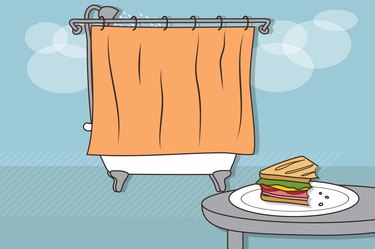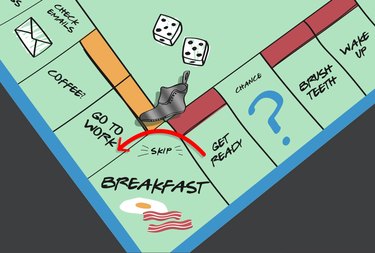
Let's take a quick poll: How often do you grab a portable meal and eat on the go?
With the realities of everyday life, we're guessing it's pretty regularly. And you might even figure that feasting on your feet is no big deal. After all, most of us are trying to sit less and get in more daily steps, right?
Video of the Day
"Many people are encouraged to steer away from a sedentary lifestyle as it can promote obesity, diabetes and overall poor health, but how does this apply to the realm of eating, namely in regard to digestion?" says Peyton Berookim, MD, FACG, a board-certified gastroenterologist at the Gastroenterology Institute of Southern California.
Here, Dr. Berookim weighs the pros and cons of making a habit of chowing down while standing upright.
Are There Benefits to Eating Standing Up?
For some people, standing while eating may help ease symptoms of acid reflux, one of the most common GI complaints, Dr. Berookim says.
Here's why: Acid reflux occurs when increased pressure in the stomach triggers your stomach contents (including food, acid and digestive juices) to travel back into the esophagus, he says. This causes symptoms like a burning sensation in the mid-chest (heartburn) or throat, sour taste in the mouth and burping, among others.
And the risk of acid reflux rises when you lie down after eating. That's because, in this supine position, food and acid can easily flow back from your stomach into your throat, which is at the same level, Dr. Berookim says.
Conversely, a standing position puts less pressure on your stomach. That means a burning backwash is less common in this eating-while-standing scenario, which translates to less acid reflux and heartburn, Dr. Berookim says.
2 Ways Eating While Standing Can Be Harmful
Still, eating while standing can have some detrimental effects on digestion. Here's how:
1. It Can Cause Gas and Bloating
"Physiologically speaking, if one is standing while eating, blood pools to their legs, given gravity, and this decreases adequate blood flow to the gut where it is needed for digestion," Dr. Berookim says. "This will cause poor carbohydrate digestion, which can lead to gas and bloating," he explains.
What's more, "Standing up while eating, also sometimes referred to as 'buffet eating,' usually involves eating more rapidly," Dr. Berookim says.
But noshing at warp speed increases the chances of swallowing more air, which can also contribute to extra gas in your tummy.
2. It Can Lead to Overeating
As we know, people who eat while standing typically tend to chow down faster, and this speedier pace results in shorter overall mealtimes, Dr. Berookim says.
Problem is, this may encourage overeating for several reasons. Firstly, "Standing while eating is usually followed by movement (as the person is probably on the go), which promotes faster digestion and may leave one feeling hungrier sooner," Dr. Berookim explains.
Secondly, when you eat fast and on your feet, you're also more apt to be distracted. And when you don't focus on your food or savor each bite, odds are you'll feel a lesser sense of satiety and fullness (read: you'll be prowling around the pantry in an hour or so).
On the other hand, "the more time one has to chew one's food, the less likely they are to overeat,'" Dr. Berookim says.
So, How Bad Is It Really to Eat While Standing?
"Bottom line, it's your choice to sit or stand," Dr. Berookim says. "Either way can be alright, but the most important thing is to be 'mindful' while eating and be in tune with what your body needs," he says.
Matter of fact, people who practice mindful eating — an approach that involves paying attention to food and being fully present as you eat — often eat less, experience greater enjoyment when eating and opt for more nutritious foods, according to August 2017 paper in Diabetes Spectrum.
Whether you sit or stand while eating, here are a few tips to help you munch more mindfully during meals:



